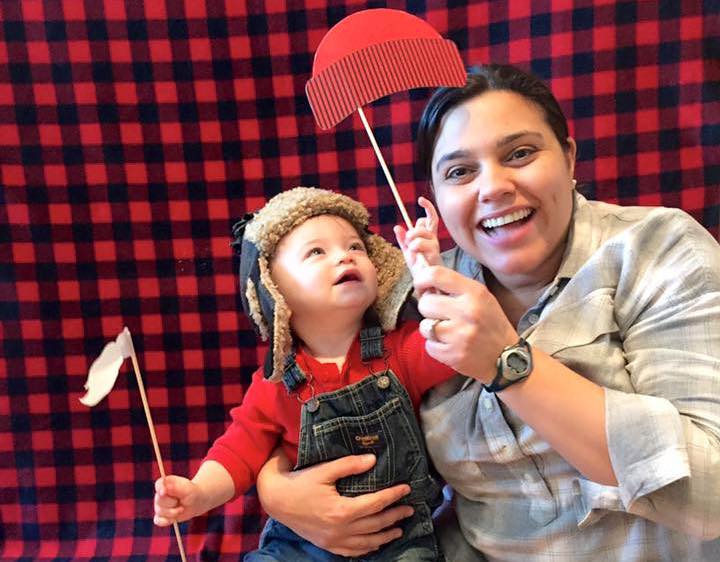A Surprise Klinefelter pregnancy
Anne and her husband, Mike, were not expecting to get pregnant seven years after their daughter was born. When they did, they had a surprise Klinefelter pregnancy with their son Breck. Here is their story.
Surprise Klinefelter pregnancy:
As soon as Anne found out she was pregnant, she wanted to have a trisomy test done. Though her daughter was healthy now, there were some questions during the pregnancy. Being seven years older and having gone through a previous scare, they didn’t wait. Like their daughter, Brent’s test came back with an increased chance of Down syndrome. They did further testing, including a NIPT, and waited.
When the results were available,, the doctor tried to reach Anne but couldn’t, so they contacted Mike, who was out of town on a business trip. Anne says she can’t remember exactly the words her husband said the genetic counselor used, but it was something to the effect of, “anatomically, it’s a boy.” It was a surprise Klinefelter pregnancy.
The doctor followed up with “don’t Google it and set up an appointment,” but her initial words were shocking. Mike called his wife to break the news. He gave her the basic facts, and they scheduled an appointment with the genetic counselor within a week. By this time, Anne had Googled 47, XXY. She said, “I don’t think I was scared by what I saw on Google. I was scared because I had a genetic test, and they had to call me and tell me something was wrong. They didn’t call me and say everything was normal.”
Understanding the diagnosis:
The couple compared the condition to Down syndrome with minimal information on the type of testing and the chromosomal aspect. When they visited the genetic counselor, she better explained Klinefelter syndrome, including something that stood out to Anne; many men didn’t know they had Klinefelter syndrome until they tried to have children. With a better understanding of the condition, they realized it was very different from Down syndrome, and Klinefelter syndrome could minimally impact him. The counselor also informed them about how they could get ahead of some issues with infant testosterone shots.
Pregnancy:
The rest of her pregnancy was strict, though unrelated to her baby’s Klinefelter syndrome diagnosis. She suffered from morning sickness almost constantly. They didn’t tell many people about the diagnosis and kept it to their immediate family.
Anne asked the genetic counselor to help her connect with other mothers of boys with Klinefelter syndrome, and she could not. Her only resources in that area were an older man and a woman who had opted to terminate her pregnancy, neither of whom were very helpful in Anne’s situation.
They knew they would keep the baby as soon as they understood the condition. As Anne says, “it’s like knowing your baby is going to have hearing loss or knowing your baby is going to be blind. You wouldn’t terminate your pregnancy just because of that.” She found groups on Facebook, but they were for adult men or families with diagnosed children who were showing symptoms. There was no one in her specific position. She had been chatting with another mom, and they decided to start a group focused on babies and toddlers. The group was an excellent resource, and though she’s not active since Breck has aged out and is higher on the spectrum, she recognizes the benefit for newly-diagnosed families.
Birth and Infancy:
Anne had cholestasis, a liver condition affecting pregnant women in their third trimester that causes skin irritation and may lead to stillborn babies, and had a c-section at thirty-eight weeks.
Anne and Mike are in the medical field and researched Klinefelter syndrome heavily before Breck was born. They decided to give him testosterone as an infant, no matter his penis size. The couple had gotten a reference for an endocrinologist at Children’s Hospital of Philadelphia (CHOP). He would perform testosterone shots on infants and met with him while Anne was still pregnant. At four weeks, Breck had testosterone shots, which have benefited him.
Though she had a beautiful baby emotionally, Anne struggled with the concept of his infertility. She would look at him and “burst into tears knowing he could never have children.” She also felt guilty that she knew this before he did.
As a baby and toddler
Besides speech issues, Breck hit his milestones around the same time as other children. After receiving his initial testosterone at CHOP, they told them they wouldn’t see him again until he was around twelve or thirteen. To take a more proactive approach, Anne and Mike found another endocrinologist at DuPont who suggested they start with early intervention.
They agreed this was the best course of action. Anne said, “We liked that approach. We had decided we were going to give him every therapy available. I know some people are more ‘wait and see, but we were like ‘nope, let’s do it.” They started with occupational therapy at four months, and he picked things up nicely, seeming to take a week to absorb things once the therapist worked with him. He did so well that he didn’t qualify for the service after a few months.
He started speech therapy at around two years old and still attends regularly. Anne would say that’s his one noticeable symptom of 47, XXY.
What she would tell other mothers:
When talking about Breck as a baby, Anne admitted to feeling emotional when people would comment on how good he was. Anecdotally, Klinefelter syndrome babies are known to be “good, ” which reminded her of his diagnosis. How good he was is something she realized she could have enjoyed more. She admitted when he was first born, she “thought about it every time she looked at him.” Now, she barely thinks about it. “I even forgot to schedule his endocrinologist appointment at one point because it’s not who he is anymore. It hasn’t been that big a deal in our lives.”
Anne would love to be able to tell mothers “not to spend their pregnancy worrying.” Anne wanted them to know it was a “waste of their energy” to be upset about it. She encouraged anxious mothers to reach out, even to her. Anne took Breck to new moms so they could see what a great kid he is.
Living With XXY:
These days, Breck is a happy little boy. He has a lot of friends and spends time irritating his beloved teenage sister for sport. Breck has a sunny personality, and people of all ages want to be around him. He plays soccer, which he loves. He’s won class elections and is excited to be the tallest member of his family. Breck has a beautiful future ahead of him, and his family is there to support him along the way.
By Chelsea Castonguay




What is the name of the group she helped co-found?
Here is a new group https://www.facebook.com/groups/livingwithxxynonprofit